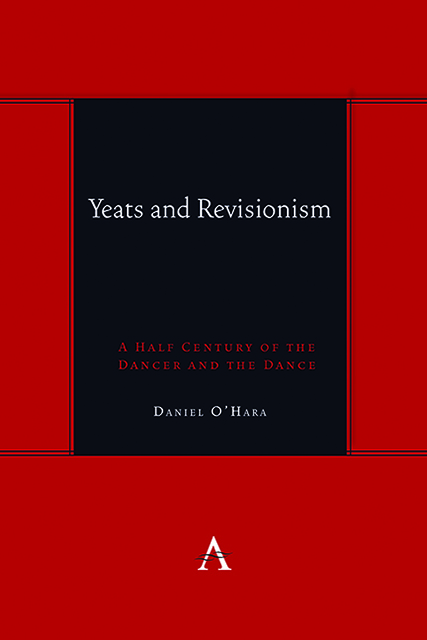Book contents
- Frontmatter
- Dedication
- Contents
- Acknowledgments
- Preface
- Introduction: Dancer and Dance: Yeats’s Romantic Modernism and Critical Revisionism
- Chapter 1 The Irony of Tradition in W.B. Yeats’s Autobiography: Dialectical Hermeneutics Beyond the New Criticism
- Chapter 2 The Specialty of Self-Victimization: On Antithetical Revisionism
- Chapter 3 Yeats in Theory: Blackmur, Bloom, De Man and Hartman
- Chapter 4 The Divisions of Yeats Studies Continued
- Chapter 5 Modernism’s Global Identity: on the Dogmatic Imagination in Yeats, Freud and Beyond
- Chapter 6 Yeats With Lacan: Toward the Real Modernism
- Chapter 7 The Spirit Medium: Yeats, Quantum Visions and Recent Lacanian Studies
- Chapter 8 And All the Ceremonies to Come: Of High Modernism, Visionary Violence and Post-Marxism
- Afterword: The Reader in Yeats
- Bibliography
- Index
- Frontmatter
- Dedication
- Contents
- Acknowledgments
- Preface
- Introduction: Dancer and Dance: Yeats’s Romantic Modernism and Critical Revisionism
- Chapter 1 The Irony of Tradition in W.B. Yeats’s Autobiography: Dialectical Hermeneutics Beyond the New Criticism
- Chapter 2 The Specialty of Self-Victimization: On Antithetical Revisionism
- Chapter 3 Yeats in Theory: Blackmur, Bloom, De Man and Hartman
- Chapter 4 The Divisions of Yeats Studies Continued
- Chapter 5 Modernism’s Global Identity: on the Dogmatic Imagination in Yeats, Freud and Beyond
- Chapter 6 Yeats With Lacan: Toward the Real Modernism
- Chapter 7 The Spirit Medium: Yeats, Quantum Visions and Recent Lacanian Studies
- Chapter 8 And All the Ceremonies to Come: Of High Modernism, Visionary Violence and Post-Marxism
- Afterword: The Reader in Yeats
- Bibliography
- Index
Summary
The essays, review-essays and brief reviews collected here were written over the last half-century and published in various leading publications of their moment. In relationship to Yeats, they trace the dance of contemporary theory-inflected criticism—its practices and personalities (including my own) over that period. For different reasons of space (both of this book and of each short individual piece) a few of them have been dropped. But their significances are either already evident in other longer pieces or are captured throughout in revision.
The major theme of the book is exemplified by Yeats’ “An Irish Airman Foresees His Death.” It is one of four poems he wrote on Major Robert Gregory, the only son of Lady Gregory, Irish poet, dramatist, folklorist and Yeats's long-time patron. The other three poems include “Shepherd and Goatherd;” “In Memory of Major Robert Gregory,” an elegy aspiring to overtop Milton's “Lycidas;” and “Reprisals,” which was first published posthumously, as much about the seemingly endless troubles of Ireland due to British rule and its aftermath, as about a bitter remembrance of Gregory's loss. As it is in the public domain, here is “Irish Airman” entire:
I know that I shall meet my fate
Somewhere among the clouds above;
Those that I fight I do not hate,
Those that I guard I do not love;
My country is Kiltartan Cross,
My countrymen Kiltartan's poor,
No likely end could bring them loss
Or leave them happier than before.
Nor law, nor duty bade me fight,
Nor public men, nor cheering crowds,
A lonely impulse of delight
Drove to this tumult in the clouds;
I balanced all, brought all to mind,
The years to come seemed waste of breath,
A waste of breath the years behind
In balance with this life, this death.
What Yeats identifies in his later work of poetry and visionary imaginings on the tragic human condition (especially in modernity) as “death-in-life” and “life-in-death,” is herein dramatized. The sublime moment of singular, individualizing feeling—“A lonely impulse of delight”—is the dance of death, as Holbein, Strindberg and Freud might envision as represented in their works. All conditions—national, local, global, gender, sexual, medical or what-have-you—pale before what Yeats, as in most of his middle and later poems, puts front and center on the stage of this remarkable poem.
- Type
- Chapter
- Information
- Yeats and RevisionismA Half Century of the Dancer and the Dance, pp. ix - xiiPublisher: Anthem PressPrint publication year: 2022



